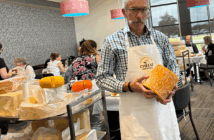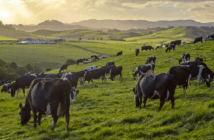By Tony Hunter, food futurist
Last month we covered some history of genetic modification of food crops. Now we’ll talk about the present and the future.
A recent addition to mutagenic plant breeding methods is aerospace mutagenesis, where seeds are sent into space and even around the moon and back. It’s not yet known exactly what causes the resulting mutagenesis, but it’s speculated that cosmic radiation, microgravity, and the weak geomagnetic field play a part. Even though the exact causes are unknown it’s been widely used in commercial crop mutagenesis, particularly by China. Some 200 “space plants” have been approved for use in China, including rice, wheat, maize, soybeans, cotton, and tomatoes. And over 3,000 more are said to be under development. The first “space rice”, Huahang-1, was approved in 2003 and by 2018 some 2.4 million hectares of space crops of all types had been planted.
Alternatively, precision plant breeding uses the new generation of genetic engineering tools including the CRISPR-Cas system and several other gene-editing tools. These techniques have several major advantages over other mutagenic technologies. Chief among these is that they can be used to design specific genetic changes in crops to cope with climate and other changes. They’re also up to six times faster, sometimes taking only two years.
Any off-target mutations of these precision methods that so concern some people surely pale into insignificance compared to conventional mutagenic methods.
Randomly generated mutations of crops for human consumption have been with us for decades. And well before plants could be genome sequenced to determine the exact results of the mutagenesis. What would the public make of this if it were commonly known? Would we have the same pushback we see against the precision plant breeding technologies?
This reinforces the need to transparently communicate technologies to consumers. They need to understand the current methods used to produce their food as well as the new technologies. That way they can make informed decisions on the future of their food.
Because without the new technologies being developed today our chances of feeding 10 billion people sustainably and equitably by 2050 look increasingly small.
Tony Hunter is a global futurist, food scientist, speaker, and foresight strategy consultant. He consults and speaks globally, using his distinctive combination of scientific qualifications, business experience, and detailed understanding of exponential food technologies to deliver a unique perspective on the future of food.





























































































